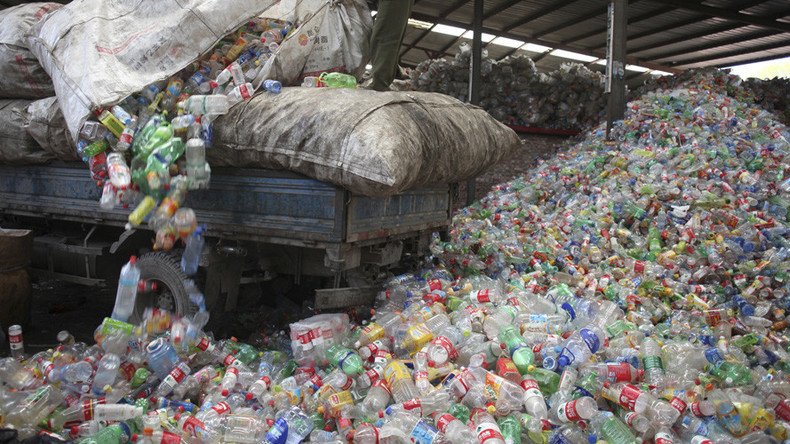1 ton of plastic produced for every person on planet, scientists reveal

US scientists estimate a total of 8.3 billion tons (metric) of plastic have been produced over the course of history, enough to cover a country the size of Argentina, and a ton of plastic for every person on the planet.
In the first global study on the history of mass-produced plastics, researchers from the University of California, Santa Barbara, also found that half of the Earth’s plastic was produced in the past 13 years alone.
We're on pace to produce 26 billion metric tons of plastic waste by 2050: https://t.co/xBCJGiw4P0
— News from Science (@NewsfromScience) July 19, 2017
Although plastic is in widespread mass-production only since the 1950s, the study describes the rapid growth of its manufacturing as “extraordinary,” with plastic now far surpassing the production of many other-man made materials, with the exception of steel, cement, and brick.
Of all the plastics ever produced and discarded, the study states nearly 80 percent have ended up in landfill or as waste in the environment. Just 9 percent have been recycled and 12 percent incinerated.
The study predicts that, if current trends continue, there would be 12 billion tons of plastic waste by 2050, equivalent to one and a half times all the plastic produced throughout history to date.
Uninhabited Pacific island has highest density of plastic waste ever reported https://t.co/dAbB90CD3gpic.twitter.com/tQAdLmSr3M
— RT (@RT_com) May 17, 2017
Despite the historically low rate of plastic recycling at global level, it has increased in Europe and China, according to the study.
In 2014, 30 percent of plastic waste was recycled in Europe, and 25 percent recycled in China. However, the US continues to lag behind Europe and China, recycling just 9 percent of its plastic waste in the same year.
Unsurprisingly, plastic’s largest primary use is packaging, with a global shift from reusable to single-use containers greatly contributing to the increase in plastic production and waste.
While plastic used in packaging is usually short term – typically less than a year – plastics used in construction and building can last decades.
It’s the versatility and durability of plastic which has seen its mass-production expand so greatly, but the study explains it’s these same strengths which make it so difficult for the material to biodegrade.
"If you spread all of this plastic equally, ankle-deep, it would cover an area the size of Argentina," Roland Geyer, a professor of industrial ecology and the study's lead author, told the Thomson Reuters Foundation.
"It is an enormous amount of material that does not biodegrade ... I am very worried."
The study equates the world’s relationship with plastics to an uncontrolled experiment.
“Without a well-designed and tailor-made management strategy for end-of-life plastics, humans are conducting a singular uncontrolled experiment on a global scale, in which billions of metric tons of material will accumulate across all major terrestrial and aquatic ecosystems on the planet.”
In 2016, a separate report done by the Ellen MacArthur Foundation predicted that by 2050 there would be more plastic than fish in the sea.












